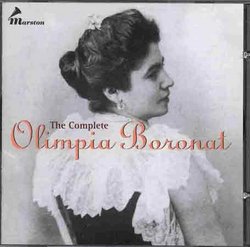| All Artists: Olimpia Boronat Title: Complete Olimpia Boronat Members Wishing: 0 Total Copies: 0 Label: Marston Release Date: 11/11/1997 Genres: Special Interest, Pop, Classical Styles: Vocal Pop, Opera & Classical Vocal Number of Discs: 1 SwapaCD Credits: 1 UPC: 638335100128 |
Search - Olimpia Boronat :: Complete Olimpia Boronat
 | Olimpia Boronat Complete Olimpia Boronat Genres: Special Interest, Pop, Classical
|
Larger Image |
CD Details |
CD ReviewsGrab It Why You Still Can! Doug - Haydn Fan | California | 10/12/2007 (5 out of 5 stars) "Before reading my review I wish to make clear - these are recordings around one hundred years old, from near the very beginning of recorded sound. As such, they are not for casual listening. If you've heard old operatic recordings before and appreciate what they offer then you should seriously consider this CD. If you are interested in hearing older recordings, but are just beginning to explore, try instead an anthology CD with a variety of singers. Or consider sopranos from the early days of stereo, such as Callas or Sutherland.
Quoting the memoirs of Levik, that indispensable guide to Russian opera's Golden Age singers, "Olimpia Boronat was one of the very best of singers, possessing a bewitching voice, great musicality, and all the resources of Italian bel canto." On this CD the indefatigable Ward Marston, restorer par excellence, works his now taken for granted magic on the complete recordings of Boronat. This consists of 21 sides, some duplicated, from the years 1904 and 1908. Boronat's first recordings apparently were all done at one 1904 session, and include several unforgettable things, including a truly remarkable performance of Bellini's aria "Qui la voce" from I Puritani, where Boronat freezes time at the close with an other-worldly high pianissimo. "Caro nome" from Rigoletto makes you forget every performance you've ever heard of this cliched work, her voice bursting forth from the shellac in open defiance of the acoustic horn's usually cruel handling of the soprano voice. The earlier of two recordings of Martha's hopelessly hackneyed "The Last Rose of Summer" holds even the most jaded critics of the piece, and offers the only real competition to Edith Mason's perfect performance. Like practically everything she did, Boronat sings this in her native Italian. These gifts from the Gods, amazing as it seems, are but opening acts; Norina's aria "So anch'io" from Donizetti's Don Pasquale rollicks along as Boronat sashays her voice from one phrase to the next, while few artists, living or dead, approach Olympia Boronat in singing the grand style necessary for the Huguenots. If all this wasn't enough there is always her take on "Come per me sereno" from La Sonnambula. Wonder follows wonder with dizzing effect. Listening to Boronat it's possible to forget to breath. A simple song by Tosti is child's play for her and she gives to it a disarming heartfelt naturalness belying her seemingly limitless technical resources. Her famous encore piece, The Nightingale, mentioned in the CD notes with a revealing story about her stage presence, she recorded twice. Believe me when I say - no one's complaining about duplicating such singing as this! The greatest operatic recital on CD? Well, it's definitely special. I'd be happy to hear a better one, but save for a greatest hits of Caruso it's proably not going to happen. Certainly there were other singers as good as Boronat, and in the case of Patti some even better, however, at least on records, few attain such exalted heights performance after performance. Here with Olympia Boronat we have a cross section of the highlights of the lyric stage from a singer in her prime whose skills follow from the end of the Age of Patti. " |

 Track Listings (21) - Disc #1
Track Listings (21) - Disc #1